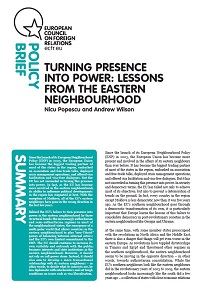TURNING PRESENCE INTO POWER: Lessons from the Eastern Neighbourhood
TURNING PRESENCE INTO POWER: Lessons from the Eastern Neighbourhood
Author(s): Nicu Popescu, Andrew Wilson
Subject(s): International relations/trade, EU-Approach / EU-Accession / EU-Development
Published by: ECFR European Council on Foreign Relations
Keywords: European Neighbourhood Policy;
Summary/Abstract: Since the launch of its European Neighbourhood Policy (ENP) in 2003, the European Union has become the biggest trading partner of most of the states in the region, embarked on association and free-trade talks, deployed crisis management operations, and offered visa facilitation and visa-free dialogues. But the EU has not succeeded in turning this presence into power. In fact, as the EU has become more involved in the eastern neighbourhood, its ability to influence political developments in the region has stagnated at best. With the exception of Moldova, all of the EU’s eastern neighbours have gone in the wrong direction in the last few years. // Behind the EU’s failure to turn presence into power in the eastern neighbourhood lie three structural trends: the increasingly authoritarian and semi-authoritarian regimes in most of the neighbourhood states; the emergence of a multi-polar world that allows countries in the eastern neighbourhood to play “neo-Titoist” games of balancing between external actors; and the EU’s own limited commitment to the ENP. The EU should continue to increase its own visibility and outreach with the public, business interests and state institutions in the eastern neighbourhood. However, it should not rely on soft power alone. Instead, it should also aim to develop a more transactional relationship with its eastern neighbours – in other words, to decide what its interests are, be less diplomatic with interlocutors and set tough conditions on issues such as visa liberalisation.
Series: ECFR Policy Briefs
- Page Count: 12
- Publication Year: 2011
- Language: English
- Content File-PDF

